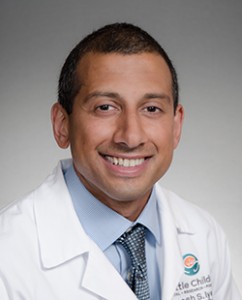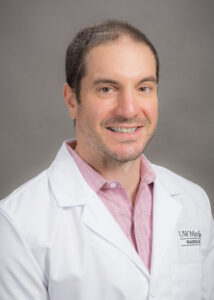Diagnostic Radiology
Diagnostic Radiology – From AAMC Careers in Medicine Specialty Profile:
Radiology is a medical specialty in which a variety of radiologic methodologies are used to diagnose and treat diseases. Diagnostic radiology encompasses a variety of diagnostic and image-guided therapeutic techniques, including all aspects of radiological diagnosis (nuclear radiology, diagnostic ultrasound, magnetic resonance, computed tomography, interventional procedures, and the use of other forms of radiant energy). Physicians studying diagnostic radiology are primarily hospital-based and can specialize in a number of areas, including: vascular interventional; neuroimaging and intervention; abdominal imaging and intervention; nuclear medicine; chest and cardiac imaging; pediatric imaging; and mammography. The radiologist’s role has grown not only through great improvements in diagnosis but also through the technological developments that permit numerous interventional radiology procedures. A diagnostic radiologist is the eye of medicine, helping the primary care physician diagnose and treat diseases.
You enjoy the topics and issues of a broad range of medical/surgical disciplines and the professional consultative process.
-Dr. Iyer and Mossa-Basha, Specialty Career Advisors
Information about specialties may be found in many places. A few suggestions:
- UW Radiology Department website – Contains a wide array of information about the specialty. Information about GME and UGME offerings may be found under the Education tab
- AAMC Careers in Medicine Specialty Profiles – a great database of medical specialties and subspecialties. Shows pathways to careers, top 5 conditions treated by each specialty, links to national professional societies for this specialty, average salary, and other lifestyle and work information
- AMA FREIDA Specialty Guide – designed to highlight major specialties, detail training information, and provide access to related association information
- Career conversations with people in the field – also consider online and social media resources
- UW Diagnostic & Interventional Radiology Interest Group (DIRIG)
- Radiology Society of North America (RSNA)
- American College of Radiology (ACR)
- Society of Imaging Informatics in Medicine (SIIM)
Review NRMP Main Residency Match Data for details on:
- Charting Outcomes in the Match: Summary statistics and characteristics of matched applicants
- Program Directors Survey: Factors program directors use to select applicants to interview
Review ERAS Statistics for details on the:
- Mean number of programs applied to in Radiology
- Number of US MD applicants in Radiology
Foundations Phase: Exploration
Exposure to Radiology in the preclinical years can be limited, but it is not zero. If the introductions you do receive raise your interest, get in contact with the interest group (DIRIG) and/or reach out to the Radiology Specialty Advisor to learn more ways to gain additional exposure. These might include shadowing, research, or participation in DIRIG events and educational gatherings.
In addition, Radiology touches just about every corner of medicine. Use the breadth of your experiences to look for the radiological piece within each.
Contacting the Specialty Career Advisor (SCA) is appropriate if you are simply considering a career in Radiology or already certain it is your path.
- For the former, it is never too early to reach out.
- For the latter, you would want to connect with the SCA, preferably, before planning your MS4 schedule. If you make your Radiology career decision after this time, it is still not too late. Contact the SCA as soon as is reasonable for you to do so.
Radiologists are physicians first, imagers second.
Community service experiences that help demonstrate who you are as a doctor are important.
Research is helpful, particularly if you believe you will pursue an academic career or at least training at an academic program.
- For Diagnostic Radiology, it is helpful if the research is imaging-related, but not a requirement. Demonstration of your successful navigation of the research process in any field can be valuable.
Leadership experiences can be helpful.
We will write a departmental letter of recommendation for you, and you can ask specific faculty members to contribute to the letter. You will need 2 additional letters from clinical clerkships, preferably including one from Medicine or Surgery. A letter from a research mentor is acceptable as a fourth letter.
- Obtaining all or most letters of recommendation from radiologists.
- Not applying to enough programs or applying to programs for which you are not competitive.
- Not completing the application before the ERAS deadline.
- In the personal statement, discussing “solving puzzles” or neglecting to mention what you can add to a residency program and your long-term goals. Not mentioning an interest in patient care.
- Not studying for Step 2 CK.
- Not reaching out to your SCA multiple times during the application, interview, and ranking process.
Involvement with Specialty Interest Groups is an essential component of career exploration. These groups provide specialty-specific learning and networking opportunities with physicians and residents, alumni, and community members.
Specialty Interest Group Panel Recordings and Links to Contact Information
Diagnostic and Interventional Radiology Interest Group (DIRIG)
Dr. Ethan Hua
Specialty Interest Group Advisor
Specialty Career Advisors provide perspective on how their specialty weighs extracurricular activities during the residency application process. This can be helpful information as you think about extracurricular activities in Foundations.
| 5 Highly Important | 4 | 3 | 2 | 1 Less Important |
|
|---|---|---|---|---|---|
| Having a Step 2CK score above 248 | ● | ||||
| Leadership involvement | ● | ||||
| Volunteer & community service involvement | ● | ||||
| Demonstrated interest in practicing in a rural or underserved community | ● | ||||
| Express a strong interest in academic medicine | ● | ||||
| Demonstrated interest & involvement in research in general | ● | ||||
| Demonstrated interest & involvement in research in this specialty | ● | ||||
| Having at least one published paper in a peer-reviewed journal | ● | ||||
| Achieving 4 or more Honors in the six 3rd year required clerkships | ● | ||||
| Achieving Honors in this specialty's clerkship rotation | ● | ||||
| More than 1 Letter of recommendation from attendings in this specialty | ● |
||||
| 1 Departmental/Chair's Letter of recommendation in this specialty | ● |
||||
| Election to Gold Humanism Honor Society (GHHS) | ● | ||||
| Election to Alpha Omega Alpha (AOA) Honor Society | ● | ||||
| 5 Highly Important | 4 | 3 | 2 | 1 Less Important |
Clinical Phase Planning
This information is for MS3s planning 4th-year schedules.
If a rotation is NOT mentioned in the Clerkship Recommendations for a Competitive Residency Application or Away Rotation Recommendations sections, the listed APCs, Sub-Is, and electives do not need to be taken for your residency application. These can be taken throughout your MS4 year.
It is best to take the Radiology sub-specialty elective (RADGY 695) no later than Summer B
An Away is not important to your application except if you specifically want to go to a particular program and if you are a competitive applicant for that program. (Only 5-10% of DR applicants do away electives.)
The following sub-internships help you prepare for residency in this specialty:
- General Medicine
- General Surgery
None in particular. Select your electives based on your interests.
According to 2020-2022 Texas STAR data, the majority of interviews for this specialty are held in…
- October – 3.96%
- November – 54.64%
- December – 30.74%
- January – 9.29%
- February – 0.14%
- N/A – 1.23%
Advice from SCA: Few interviews are held during the week of Thanksgiving and the week immediately after (RSNA week), and none are held during the winter holiday break.
Programs in the Midwest and New England tend to interview earlier, before winter weather sets in.
Most programs (other than UW) on the West Coast schedule the majority of their interviews in December and January.
Residency Application Planning
This specialty offers training in both Categorical programs and Advanced programs that are paired with Preliminary or Transitional Year programs. Most residency programs in Radiology are Advanced programs.
- A categorical residency begins at PGY-1 year and continues for subsequent years until the end of the training.
- Advanced programs start in the second year (PGY-2) of residency and continue until the end of the training.
Applying to Advanced programs means students should also apply to Preliminary or Transitional Year programs for their first year of residency (PGY-1).
- Depending on the specialty, students applying to Advanced programs commonly apply to Preliminary Internal Medicine, Preliminary Surgery, or Transitional Year programs.
- Talk with your Specialty Career Advisor or Career Advisor for guidance in Radiology.
We will write a departmental letter of recommendation for you, and you can ask specific faculty members to contribute to the letter. You will need 2 additional letters from clinical clerkships, preferably including one from Medicine or Surgery. A letter from a research mentor is acceptable as a fourth letter.
- Obtaining all or most letters of recommendation from radiologists.
- Not applying to enough programs or applying to programs for which you are not competitive.
- Not completing the application before the ERAS deadline.
- In the personal statement, discussing “solving puzzles” or neglecting to mention what you can add to a residency program and your long-term goals. Not mentioning an interest in patient care.
- Not studying for Step 2 CK.
- Not reaching out to your SCA multiple times during the application, interview, and ranking process.
- 3 letters are sufficient:
- 2 letters obtained from required clinical clerkships – Ideally, one would be from a more cognitive specialty and the other from a more procedural specialty, but both can come from the same category
- Find mentors who will write your strongest support before worrying about what specialties they represent
- Additional LOR(s) can be obtained from research mentors, extracurricular/volunteer activities, etc., if those experiences have been significant and the writers will bring “new facets” of you to the application
- 2 letters obtained from required clinical clerkships – Ideally, one would be from a more cognitive specialty and the other from a more procedural specialty, but both can come from the same category
40-50 for “average applicant”
At what point in the interview season should a student be concerned about the number of interviews they have secured in this specialty?
- Most students receive at least 3-5 interview offers by October 15. Contact your SCA if you have less than 3 by mid-October.
If a student is concerned about their application status during interview season what should they do?
- Contact Radiology SCA to discuss the desirability of applying to more programs and/or contacting residency program coordinators by email.
Specialty Career Advisors provide perspective on how their specialty weighs extracurricular activities during the residency application process.
| 5 Highly Important | 4 | 3 | 2 | 1 Less Important |
|
|---|---|---|---|---|---|
| Having a Step 2CK score above 248 | ● | ||||
| Leadership involvement | ● | ||||
| Volunteer & community service involvement | ● | ||||
| Demonstrated interest in practicing in a rural or underserved community | ● | ||||
| Express a strong interest in academic medicine | ● | ||||
| Demonstrated interest & involvement in research in general | ● | ||||
| Demonstrated interest & involvement in research in this specialty | ● | ||||
| Having at least one published paper in a peer-reviewed journal | ● | ||||
| Achieving 4 or more Honors in the six 3rd year required clerkships | ● | ||||
| Achieving Honors in this specialty's clerkship rotation | ● | ||||
| More than 1 Letter of recommendation from attendings in this specialty | ● |
||||
| 1 Departmental/Chair's Letter of recommendation in this specialty | ● |
||||
| Election to Gold Humanism Honor Society (GHHS) | ● | ||||
| Election to Alpha Omega Alpha (AOA) Honor Society | ● | ||||
| 5 Highly Important | 4 | 3 | 2 | 1 Less Important |
Connect with the Radiology Specialty Career Advisors (SCA)
It is important to be prepared for a conversation with an SCA. Please read the following before contacting them.
Read in entirety: Guidelines for Contacting SCA
Under “When and How to Contact SCAs” you will find information about when each SCA is willing to meet with students and SCA contact information.
When reaching out for the first time, ensure you have identified 2-3 specific questions you hope to have answered; these should not focus on general info found in other places.
Remember that the primary focus of the SCA role is to advise and support clinical students.
Before contacting the SCA, make sure to read the Guidelines for Contacting SCAs. Here you will find important preparatory information, as well as a table that indicates the earliest you should be reaching out to any of the SCAs.
 Dr. Ramesh Iyer
Dr. Ramesh Iyer
Co-Specialty Career Advisor
 Dr. Mahmud Mossa-Basha
Dr. Mahmud Mossa-Basha
Co-Specialty Career Advisor
